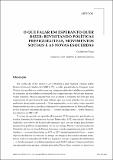Files in this item
O que falar em esperanto quer dizer : revisitando políticas prefigurativas, movimentos sociais e as novas esquerdas
Item metadata
| dc.contributor.author | Moreira Fians, Guilherme | |
| dc.date.accessioned | 2023-05-11T15:30:15Z | |
| dc.date.available | 2023-05-11T15:30:15Z | |
| dc.date.issued | 2023-05-08 | |
| dc.identifier | 285793074 | |
| dc.identifier | d6296f46-edad-4080-9872-79a273c8855e | |
| dc.identifier | 85167801294 | |
| dc.identifier.citation | Moreira Fians , G 2023 , ' O que falar em esperanto quer dizer : revisitando políticas prefigurativas, movimentos sociais e as novas esquerdas ' , Mana: Estudos de Antropologia Social , vol. 29 , no. 1 , pp. 1-31 . https://doi.org/10.1590/1678-49442023v29n1e2023002.pt | en |
| dc.identifier.issn | 0104-9313 | |
| dc.identifier.other | ORCID: /0000-0002-5223-3362/work/135019223 | |
| dc.identifier.uri | https://hdl.handle.net/10023/27582 | |
| dc.description | Funding: Leverhulme Trust (RPG-2021-215). | en |
| dc.description.abstract | Since the first half of the twentieth century, a left-wing collective in Paris has organized weekly meetings to debate politics from different progressive perspectives. Interestingly, these debates are held in Esperanto, a language created to fight nationalist rivalries and stimulate international communication. Based on an ethnography of this debate group, this article invites us to rethink how anthropology has used the term prefiguration as a classificatory category to distinguish the political practices of the new left from those of the old left. Examining how Esperanto has historically been labeled a universalist project, I show how the perspective of prefiguration enables us to highlight the ordinary use of this language in the creation of horizontal spaces for the co-production of political knowledge among activists. From this, I argue that the use of prefiguration as a shortcut to distinguish and typify social movements not only is ethnographically counterproductive, but also entails neglecting the convergences that the new and the old left often seek to build in order to enrich their dialogues and collective struggles. | |
| dc.format.extent | 31 | |
| dc.format.extent | 259676 | |
| dc.language.iso | por | |
| dc.relation.ispartof | Mana: Estudos de Antropologia Social | en |
| dc.subject | Prefiguration | en |
| dc.subject | Political activism | en |
| dc.subject | Social movements | en |
| dc.subject | New left | en |
| dc.subject | Esperanto | en |
| dc.subject | JC Political theory | en |
| dc.subject | PM Hyperborean, Indian, and Artificial languages | en |
| dc.subject | T-NDAS | en |
| dc.subject | MCC | en |
| dc.subject.lcc | JC | en |
| dc.subject.lcc | PM | en |
| dc.title | O que falar em esperanto quer dizer : revisitando políticas prefigurativas, movimentos sociais e as novas esquerdas | en |
| dc.title.alternative | What it means to speak Esperantorevisiting prefigurative politics, social movements and the new left | en |
| dc.type | Journal article | en |
| dc.contributor.sponsor | The Leverhulme Trust | en |
| dc.contributor.institution | University of St Andrews. School of History | en |
| dc.identifier.doi | https://doi.org/10.1590/1678-49442023v29n1e2023002.pt | |
| dc.description.status | Peer reviewed | en |
| dc.identifier.grantnumber | ORPG-9241 | en |
This item appears in the following Collection(s)
Items in the St Andrews Research Repository are protected by copyright, with all rights reserved, unless otherwise indicated.

